Abrogation of antibody-induced arthritis in mice by a self-activating viridin prodrug and association with impaired neutrophil and endothelial cell function
Author(s)
Stangenberg, Lars; Ellson, Chris; Cortez-Retamozo, Virna; Ortiz-Lopez, Adriana; Yuan, Hushan; Blois, Joseph; Smith, Ralph A.; Weissleder, Ralph; Benoist, Christophe; Mathis, Diane; Josephson, Lee; Mahmood, Umar; Yaffe, Michael B; ... Show more Show less
DownloadYaffe_Abrogation.pdf (1.047Mb)
OPEN_ACCESS_POLICY
Open Access Policy
Creative Commons Attribution-Noncommercial-Share Alike
Terms of use
Metadata
Show full item recordAbstract
Objective:
To test a novel self-activating viridin (SAV) prodrug that slowly releases wortmannin, a potent phosphoinositide 3-kinase inhibitor, in a model of antibody-mediated inflammatory arthritis.
Methods:
The SAV prodrug was administered to K/BxN mice or to C57BL/6 (B6) mice that had been injected with K/BxN serum. Ankle thickness was measured, and histologic changes were scored after a 10-day disease course (serum-transfer arthritis). Protease activity was measured by a near-infrared imaging approach using a cleavable cathepsin–selective probe. Further near-infrared imaging techniques were used to analyze early changes in vascular permeability after serum injection, as well as neutrophil–endothelial cell interactions. Neutrophil functions were assessed using an oxidative burst assay as well as a degranulation assay.
Results:
SAV prevented ankle swelling in mice with serum-transfer arthritis in a dose-dependent manner. It also markedly reduced the extent of other features of arthritis, such as protease activity and histology scores for inflammation and joint erosion. Moreover, SAV was an effective therapeutic agent. The underlying mechanisms for the antiinflammatory activity were manifold. Endothelial permeability after serum injection was reduced, as was firm neutrophil attachment to endothelial cells. Endothelial cell activation by tumor necrosis factor α was impeded by SAV, as measured by the expression of vascular cell adhesion molecule. Crucial neutrophil functions, such as generation of reactive oxygen species and degranulation of protease-laden vesicles, were decreased by SAV administration.
Conclusion:
A novel SAV prodrug proved strongly antiinflammatory in a murine model of antibody-induced inflammatory arthritis. Its activity could be attributed, at least in part, to the inhibition of neutrophil and endothelial cell functions.
Date issued
2009-07Department
Massachusetts Institute of Technology. Department of BiologyJournal
Arthritis & Rheumatism
Publisher
Wiley Blackwell
Citation
Stangenberg, Lars, Chris Ellson, Virna Cortez-Retamozo, Adriana Ortiz-Lopez, Hushan Yuan, Joseph Blois, Ralph A. Smith, et al. “Abrogation of Antibody-Induced Arthritis in Mice by a Self-Activating Viridin Prodrug and Association with Impaired Neutrophil and Endothelial Cell Function.” Arthritis Rheum 60, no. 8 (August 2009): 2314–2324.
Version: Author's final manuscript
ISSN
00043591
15290131